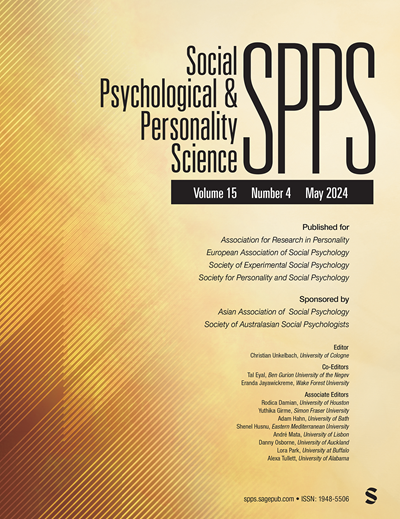人类的责任:性格信息在责任判断中的作用
IF 3.3
2区 心理学
Q1 PSYCHOLOGY, SOCIAL
引用次数: 0
摘要
性格信息如何影响对责任的判断?一些人认为,性格信息与责任间接相关,因为它丰富了对不法行为人心理状态的判断。另一些人则认为,即使性格特征与不法行为没有因果关系,性格信息也与责任直接相关。我们对这些观点提出了一个经验性的综合方案:双通道责任模型。该模型预测,当性格信息与引起指责的不法行为相关时,性格信息会直接影响指责。此外,性格信息对责备的影响取决于对真实自我的判断,而这种判断与对意向性的判断无关。在三项预先登记的研究中(N = 662),我们发现双通道模型的所有三个预测都得到了支持。我们认为这反映了指责的两种不同功能:鼓励遵守规范的社会调节功能和鼓励个人进步的教育功能。本文章由计算机程序翻译,如有差异,请以英文原文为准。
Blame for Hum(e)an Beings: The Role of Character Information in Judgments of Blame
How does character information inform judgments of blame? Some argue that character information is indirectly relevant to blame because it enriches judgments about the mental states of a wrongdoer. Others argue that character information is directly relevant to blame, even when character traits are causally irrelevant to the wrongdoing. We propose an empirical synthesis of these views: a two channel model of blame. The model predicts that character information directly affects blame when this information is relevant to the wrongdoing that elicits blame. Furthermore, the effect of character information on blame depends on judgments about the true self that are independent of judgments of intentionality. Across three preregistered studies ( N = 662), we found support for all three predictions of the two channel model. We propose that this reflects two distinct functions of blame: a social regulatory function that encourages norm compliance and a pedagogical function that encourages personal improvement.
求助全文
通过发布文献求助,成功后即可免费获取论文全文。
去求助
来源期刊

Social Psychological and Personality Science
PSYCHOLOGY, SOCIAL-
CiteScore
12.50
自引率
1.80%
发文量
77
期刊介绍:
Social Psychological and Personality Science (SPPS) is a distinctive journal in the fields of social and personality psychology that focuses on publishing brief empirical study reports, typically limited to 5000 words. The journal's mission is to disseminate research that significantly contributes to the advancement of social psychological and personality science. It welcomes submissions that introduce new theories, present empirical data, propose innovative methods, or offer a combination of these elements. SPPS also places a high value on replication studies, giving them serious consideration regardless of whether they confirm or challenge the original findings, with a particular emphasis on replications of studies initially published in SPPS. The journal is committed to a rapid review and publication process, ensuring that research can swiftly enter the scientific discourse and become an integral part of ongoing academic conversations.
 求助内容:
求助内容: 应助结果提醒方式:
应助结果提醒方式:


